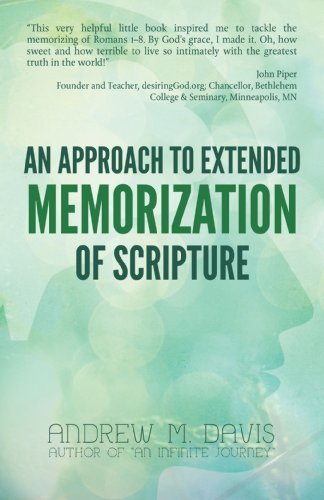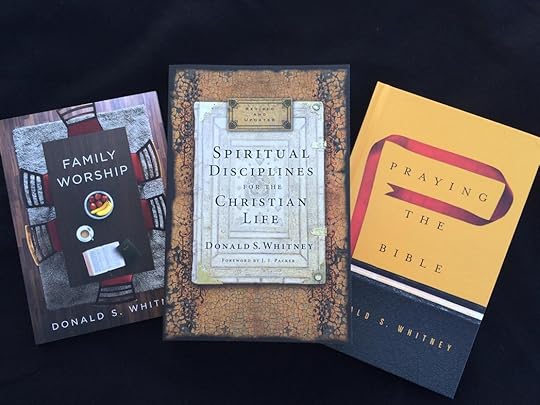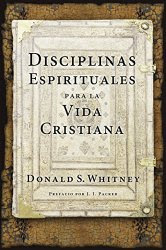Donald S. Whitney's Blog, page 3
June 7, 2017
How I Started Reading the Bible Every Day: Encouragement for Parents & Children
I literally don’t remember not reading the Bible every day. Here’s how it happened.
I’m told I started reading fairly early, reading Dick and Jane books sometime before my fifth birthday. But while I remember reading the books, I have no recollection of starting to read them.
I do remember learning words and phrases by watching TV commercials that consisted of nothing more than an announcer reading exactly what was on the black-and-white screen. In particular I recall a long-running commercial for a Memphis-area car dealer. It was just black words on a white background, like broadcasting a 60-second video of a poster, advertising a Volkswagen Beetle. Eventually I realized that the voice-over corresponded exactly to what I was seeing, and I learned to read along. On small-market stations—such as the four channels we could receive from Memphis television in the late 1950s—local advertising was a very low-budget enterprise.
So by sometime early in elementary school—though I don’t remember exactly when—I was able to start reading the narrative passages of Scripture.
I didn’t realize it at the time, but one of the greatest blessings in my life was not just learning to read at an early age, but being trained at that age to read the Bible every day. My dad modeled daily Bible reading, and lovingly encouraged me in the practice. My mother made sure I had adequate lighting above my bed, the place where I did most of my childhood reading.
We attended a church where my Sunday School teachers asked every week if each of us boys had read the Bible every day. In fact, this was a churchwide practice. Each Sunday School class, from the school-age children on up, kept records of how many in each class brought a Bible that morning, had read it every day the previous week, had read the printed Sunday School lesson, were staying for the worship service, and more. Each class reported its results to the church Sunday School superintendent who compiled them as a weekly snapshot of some measurable aspects of the church’s discipleship. In those days, this was done in virtually all of the thousands of churches in the denomination.
For most of my boyhood and teenage years, two men—first one, then later the other—taught my Sunday School class. Both were deacons in the church, and I respected them. I never thought of either of them as particularly holy men, at least not in the sense that I did of a couple of the elderly men in the church. Yet Sunday after Sunday, at the beginning of class my teacher would ask each boy in the class who had read his Bible every day that week to raise his hand. There was no pressure or shame. It’s just what we did. Everyone who came to church was expected as a normal part of life to read his or her Bible every day. It was in the air we breathed.
But this was more than a mere expectation, for the church provided practical, if simple, help for daily Bible reading. Every person who attended Sunday School was given an age-graded publication called a “quarterly.” This was a booklet of about fifty pages which contained the “lesson” for each Sunday in a quarter of a year, thus the term “quarterly.” This was published by the denomination, purchased by the church, and distributed with the hope that each person who attended Sunday School would read the week’s lesson before it was discussed in class on Sunday morning,
But the quarterly also served another purpose. Inside the back cover was a list of the suggested Bible readings for each day in the quarter. I don’t recall the scheme of the schedule used in my childhood. I seem to remember that most of the time the readings were not sequential in terms of reading through complete books of the Bible. But eventually, I think that at least for older readers, the plan was modified to one that took you through the entire Bible in a three-year cycle.
Legalistic? Well, any sort of structure in the Christian life can contribute to legalism if one is inclined that way. And any who thought (and I’m sure some did) that reading the Bible every day (or doing any other good deed) would earn them a ticket to Heaven were gravely mistaken. In my church, Ephesians 2:8-9 (we’re saved by grace through faith, and not by works) was a constant theme.
But I was a child, and we all—but especially children—need some structure when beginning to learn something as big and important as the Bible. Without guidance and a plan, children will flounder when trying to read and understand the Bible on their own.
So I was encouraged at home and at church to read the Bible every day, and I was given a simple plan for doing so. And it worked. It served me well. It helped me begin a practice that became second nature and has continued for a lifetime. Every day, for almost sixty years, I’ve not had to stop and think about whether I’m going to read the Bible, at least not think about it any more than I’ve had to decide whether to put on clothes or to eat that day. And by grace, the Word of God has done it’s work in my soul. My earthly and eternal life are immeasurably different because of the simple practice of reading the Bible every day and what has resulted from it.
Well, that’s my story. I believe the same simple factors, that is, Godly influences and reading plan, with the specifics adjusted for your own context, can work for you and your family, too.
P.S. I was prompted to write this story as result of being asked to consider writing an endorsement for a forthcoming Crossway book by David Murray called Exploring the Bible: A Bible Reading Plan for Kids (Crossway, 2017). Writing the endorsement reminded me of the beginnings of my own Bible reading. That expanded the endorsement into a foreword for the book. The foreword expanded into this blog post.
Simple resources like David Murray’s book are so important. I don’t even want to imagine what my Christian life and my ministry would have been without the encouragement and structure for daily Bible reading I received as a child. But if I’d had something like Exploring the Bible: A Bible Reading Plan for Kids. I think my scriptural foundations would have been even stronger. Blessed beyond their knowing is the boy or girl who receives a workbook like Murray’s and the loving help to complete it.
P.P.S — A few years ago, Justin Taylor did the church a great service when he complied a long list of links to various Bible reading plans.
Photo from Inquisitr.
April 24, 2017
He’s Memorized 42 Books of the Bible and You Can, Too
There may be other Christians more committed to the discipline of Scripture memory than Pastor Andy Davis, but I’ve not met them.
But I do know Andy, and can tell you that he’s the real deal. Not only is he the most diligent memorizer of Scripture I’ve ever known, he’s also a genuinely godly man, a devoted husband (to Christine) and father (of five), a careful expositor of Scripture, and a faithful pastor. Since his graduation with a Ph,D. in church history from The Southern Baptist Theological Seminary in 1998, he has been pastor of First Baptist Church of Durham, NC. Before that, Andy served as an SBC International Mission Board church planter in Japan.
In 2014, Baptist Press wrote a story about Andy, who at that time had memorized an astounding 35 books of the Bible. Since then he has added another seven.
A few days ago I interviewed Andy by phone in one of my seminary classes. I thought that the readers of this blog might profit from some of the highlights of that conversation.
Why you shouldn’t be intimidated
First of all, before you think Andy is blessed with a superpower memory and uses it to internalize Scripture to a degree you could not, realize that he does not permanently retain all he has memorized. He doesn’t have complete recollection of all 42 books ready on his lips. Exactly 100 days after he has memorized a book of the Bible word-perfectly, his retention of it begins to erode.
That’s because following his complete mental mastery of a book, he recites it each day for 100 days, then moves on to another book. Once he stops reviewing a book, his ability to recall every chapter and verse of it starts to fade.
Of course, he doesn’t forget everything. The months he invested saturating his mind with the book results in a lasting familiarity with the flow and message of the text. Sections of it remain indelibly impressed for immediate retrieval.
So while he retains less and less over time of the exact wording of the books he no longer reviews, his overall grasp of those books (and their grip on him) isn’t diminished. The lifetime benefits of books memorized years ago is unquestioned. Still, it’s encouraging to those of us who are tempted to think that Andy’s ability to memorize is superior to our own to know that, like everyone else, he also doesn’t remember what he doesn’t review.
Why you can memorize like this
Despite that concession, many believers would still be tempted to believe they couldn’t memorize entire books of the Bible. They imagine the little letter of Third John would be as impossible to memorize as the Gospel of John.
Andy says that’s not true. So what’s his secret? It’s simple: repetition over time.
In other words, you keep repeating a book, one verse at a time, over and over until you have it.
Here’s how
Let’s say you plan to memorize the book of Ephesians. On day one you read Ephesians 1:1 aloud ten times. Then you cover it and recite it ten times, adding the chapter number and verse number, saying “1:1.” That’s it for day one.
On day two you begin the principle of “yesterday’s verse first.” So you review verse one, saying it aloud ten times—looking at the verse as needed—and always saying the verse number. Then you go to verse two, reading it aloud ten times, then saying it from memory ten times, each time starting with “1:2.” You’re done for day two.
On day three you review yesterday’s verse first, reciting Ephesians 1:2 ten times, looking at your Bible as necessary. Then you begin the daily practice of reviewing all your verses, so you say Ephesians 1:1-2 aloud ten times, including the verse number for each verse. Now you learn your new verse, using the same method as before: saying verse three aloud ten times and quoting it ten times. That’s all for day three.
By day four you’ve learned the process and have momentum. As before, you review yesterday’s verse first, then all previous verses, and then learn your new verse.
Just repetition over time
There’s no magic here. Just repetition over time. Once you’ve learned the entire book, you stop learning new verses and repeat the entire book daily for one hundred days. Then you start a new book.
Andy says he never spends more than fifteen minutes a day working on Scripture memory. Even during his 100-day review of an entire book, he can recite most of them in fifteen minutes or less. For books that take more than fifteen minutes to say aloud, he sometimes recites only part of the book.
Want more?
Dr. Davis wrote a helpful booklet on An Approach to Extended Memorization of Scripture. In it he explains how he began memorizing Scripture, and provides more detailed instructions on the daily process of memorizing entire books.
A Kindle edition is available for 99 cents on Amazon, or you can download a PDF of it (in English, Japanese, or Spanish) for free here on the First Baptist Church website.
More teaching by Dr. Davis on Scripture memory, including a summary of the Bible’s teaching on memorizing Scripture, the benefits of doing so, why he believes it’s best to memorize entire books instead of isolated verses, and answers to the most common excuses for not memorizing Scripture is available here on the church’s website.
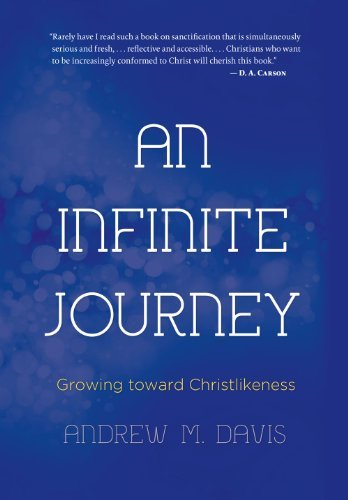 I’d also recommend his book, An Infinite Journey: Growing Toward Christlikeness.
I’d also recommend his book, An Infinite Journey: Growing Toward Christlikeness.
Besides the Bible, it would be difficult to find any other single resource with more biblically sound, theologically rich, pastorally helpful, and practical insight about Christian growth than this book.
I’d recommend it to anyone on the “infinite journey” toward Christlikeness.
What about it?
James 1:25 says this about coming to God’s Word: “the one who looks into the perfect law, the law of liberty, and perseveres, being no hearer who forgets but a doer who acts, he will be blessed in his doing.” The one who memorizes Scripture is the one most determined not to be one “who forgets.” Which will you be?
Photo from Baptist Press
April 3, 2017
10 Questions to Ask to Benefit from a Conference or Special Event
I’ve had the privilege of attending countless conferences and other special events. Some were primarily inspirational, others were mainly instructive, and many were for the purpose of conducting business, hearing reports, and connecting with people. They usually last from half-a-day to several days in length.
Afterward, however—regardless of how much I enjoyed myself or how profitable the experience seemed at the time—I often reflect upon the resources I’ve devoted to attendance and wonder if I have benefited from the conference/event as much as I could have.
Having invested hours or days of my life in this way, I want to know that it’s been time well spent.
To better ensure good stewardship of the opportunity, I have developed these ten questions.
1. What’s the single most important truth I have learned at this conference/event?
2. What’s the most important thing in my life that will be different or I will attempt to change as a result of attending this conference/event?
3. What’s the next step I should take to incorporate this change into my life?
4. What’s the single most important resource I should acquire at or after this conference/event?
5. When will I begin to read/listen to/utilize this resource?
6. Who is one person at this conference/event with whom I should discuss this conference/event?
7. Who is one person after this conference/event with whom I should discuss something from this conference/event?
8. Who is the one person at this conference/event I most need to encourage?
9. Who is someone who has helped to organize or serve at this conference/event who deserves a word of gratitude and would be encouraged to know of the impact of this conference/event in my life?
10. What’s one thing I should pray about for myself and for others as a result of this conference/event?
This resource is available here as a free, downloadable PDF document, formatted as a bulletin insert (perhaps for use by those attending a conference or event at your church).
December 22, 2016
2016 CFBS Christmas Newsletter
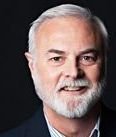
Christmas greetings from the Whitney family and
The Center for Biblical Spirituality.
Joy to the world, the Lord is come!
Before I give you an update on ministry of the CFBS and on the Whitney family, I’ll mention the following resources in hopes that they might serve you and/or your ministry.
First is a new blog post, a Christmas meditation on “God, the House-building God.”
These “ Ten Questions to Ask at a Christmas Gathering ” may be of service in stimulating discussion in slow or difficult conversational settings this week. I’m hopeful they’ll be especially useful in settings where you want to ultimately share the gospel.
Ready for 2017? Ready or not, it’s almost here. These “Ten Questions to Ask at the Start of a New Year or on Your Birthday” may help you enter the new year more thoughtfully and deliberately. At the end is a bonus of 21 additional questions, for a total of one for every day in the month of January. This Sunday or the next would be the ideal time to print this document as a bulletin insert or handout for your church or small group.
Hoping to read through the Bible in 2017, but not sure how to go about it? Or maybe you read through the Bible on a regular basis, but would consider altering your approach. Last yearJustin Taylor collected several dozen different Bible reading plans. Here’s a link to that post at The Gospel Coalition Blog.
Next, here’s a “ Bible Reading Record ” to assist you in reading through the Bible next year. Regardless of your pace or plan, this tool can keep you on track. Print a paper copy, put it in your Bible, and cross off chapters as you read them. Or download it to your smartphone or tablet, then delete or italicize the chapters you complete each day.

 Say hello to my grandson, Trippe! My daughter, Laurelen, and her husband, Mike, presented us with Trippe on May 27, so he’ll be seven-months-old soon. Obviously, this happy little fella is the most handsome grandson in the world, although admittedly as a new cereal-eater he is still working on a few of the finer points of keeping the food in his mouth. So far our two favorite activities together are sitting in the porch swing with each other and anything that makes Trippe laugh.
Say hello to my grandson, Trippe! My daughter, Laurelen, and her husband, Mike, presented us with Trippe on May 27, so he’ll be seven-months-old soon. Obviously, this happy little fella is the most handsome grandson in the world, although admittedly as a new cereal-eater he is still working on a few of the finer points of keeping the food in his mouth. So far our two favorite activities together are sitting in the porch swing with each other and anything that makes Trippe laugh.
One of Caffy’s most satisfying activities is investing in the lives of women in the Southern Seminary Wives Institute. Led by Mrs. Mary Mohler, wife of SBTS President Albert Mohler, the program involves both seminary faculty and faculty wives. Caffy is involved in both teaching and discipling these young women.

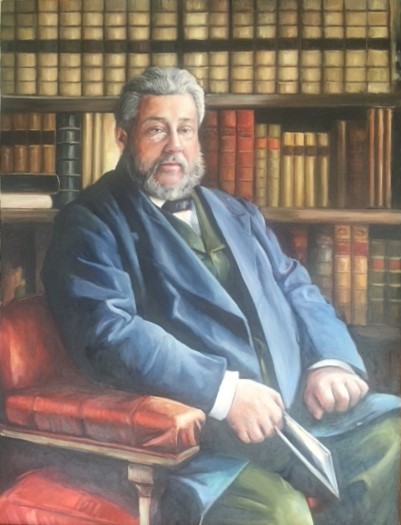

Caffy’s talent and passion for art is manifested year-round by teaching art and art history at the Sayers Classical School in Louisville, and by teaching a couple of dozen private art students. In between she produces commissioned art work and pieces for her own pleasure. The latter category is represented by the two large pieces on the right of the fountain in the Norton Commons area of Louisville and Hinkle, Mike and Laurelen’s bulldog. The 4 x 5 portrait of Charles Spurgeon was done for the office of Dr. Jason Allen, president of Midwestern Baptist Theological Seminary in Kansas City, where Spurgeon’s Library is housed in a marvelous new facility.

Another highlight for me in 2016 was the release of the Crossway edition of my Family Worship book. In conjunction with that, Crossway released a free, five-part video series on family worship called “Family Worship 101.”
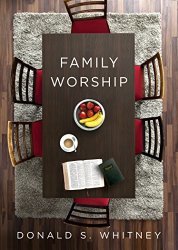 By going to this page to sign up (simply by providing your email address), you’ll receive an email from Crossway each day for the next five days. Each email will contain a video (of about 3 to 5 minutes) in which I teach practical tips on leading family worship. Here’s a sample:
By going to this page to sign up (simply by providing your email address), you’ll receive an email from Crossway each day for the next five days. Each email will contain a video (of about 3 to 5 minutes) in which I teach practical tips on leading family worship. Here’s a sample:
Family Worship 101 with Don Whitney from Crossway on Vimeo.
Also new in 2016 was the release of the Spanish translation of my two most popular books, Disciplinas espirituales para la vida cristiana and Orando la Biblia. The are available in both print and Kindle editions. And though I’m not able to tell you where to get a copy, I can announce that just a few days ago the Korean edition of my Praying the Bible was released.

On the CFBS website we now have our three best-selling resources available in what we are calling the “Spiritual Disciplines 3-Pack.” You can order Spiritual Disciplines for the Christian Life, Family Worship, and Praying the Bible for $27.00. The cost includes shipping and handling. This is a savings of more than $3.00 off Amazon’s best price.
If, however, you prefer to order the e-book edition for your Kindle (or Kindle app), you can do that, too. Below are links that will take you directly to Amazon where you can order Spiritual Disciplines for the Christian Life for $9.07, Family Worship for $5.37, and Praying the Bible for $8.53.

Did you know you can support The Center for Biblical Spirituality while you shop on Amazon? It is as simple as going to smile.amazon.com and choosing The Center for Spiritual Disciplines as your charitable organization. The smile.amazon.com website is Amazon. You’ll notice no difference in appearance or function. It is simply the portal into Amazon created by Amazon to allow its customers to designate a portion of their purchases to a non-profit organization.
So whenever you go to smile.amazon.com and order anything, Amazon will donate a small percentage to The Center for Biblical Spirituality. There is no other information exchanged (such as who made the purchase or for how much) except that Amazon let’s us know at the end of the month of the total that the CFBS has received a donation. Thank you!
When the Lord moves people to provide financial support for The Center for Biblical Spirituality, I am very grateful, both to the Lord and to His human instrument. Right now gifts to this ministry would be used to provide some much-needed administrative help and allow me to focus more on preaching, teaching, and writing. Our address for tax-deductible gifts is The Center for Biblical Spirituality, 11113 Peppermint St, Prospect, KY 40059-6603. If you’d prefer to give by phone, our number is 502-883-1096.

If you’re active on Twitter and/or Facebook, you can follow my Twitter posts via @DonWhitney and get my Facebook feed by “liking” my page there .

“Finally, brothers, pray for us” (2 Thess. 3:1).
Pray for our family. On January 8 Caffy and I will celebrate 40 years of marriage. My mother recently began her seventh year with us. Since falling and breaking her pelvis last year she has lived nearby in an assisted living facility. Please pray for Mike and Laurelen as they grow in grace as believers, as a couple, and as parents.
Pray for my ministry of teaching as professor of biblical spirituality and associate dean at The Southern Baptist Theological Seminary in Louisville. One out of five seminary students in America is in one of the six SBC seminaries, and the oldest and largest of these six is SBTS. We train students from all fifty states and dozens of countries, including more than half of the Master of Divinity students in the SBC seminaries. It is a solemn and joyful responsibility to prepare these students for a lifetime of service to Jesus and His kingdom.
Pray for my preaching, teaching, and writing done in addition to my seminary ministry. In 2016 I preached or taught 198 times and was interviewed on 22 radio programs or podcasts and two TV broadcasts. This also included 32 churches and 5 denominational events and pastors’ conferences in 16 states via 70 airplanes and more than 42,000 miles. This is a joyous privilege, but a heavy responsibility. It is impossible without prayer.
At the close of this year, I want to express my thanks to all you who pray for us. Thanks also to those who send financial support to The Center for Biblical Spirituality. These are all gifts from Him “who richly supplies us with all things to enjoy” (1 Timothy 6:17). Most of all, “Thanks be to God for His indescribable gift,” the Lord Jesus Christ (2 Corinthians 9:15). May the Lord greatly bless you this Christmas season and new year!
By His grace and for His glory,
Don Whitney

The Center for Biblical Spirituality
11113 Peppermint St.
Prospect, KY 40059
December 20, 2016
God, the House-building God
In 2 Sam. 7:2, King David noted the incongruity of him living “in a house of cedar, [while] the ark of God dwells in a tent.” He spoke with the prophet Nathan, who encouraged him in his plan to build a house—a temple—for God.
It was good that David wanted to build a house for God. It was precious in God’s sight that it was in David (initiated by God’s grace) to want to do something great for God because of his love for God.
“But that same night the word of the LORD came to Nathan, ‘Go and tell my servant David, ‘Thus says the LORD: Would you build me a house to dwell in? . . . The LORD declares to you that the LORD will make you a house’’” (vv. 4-5, 11).
In grace God responded to David’s love by promising something for David that was infinitely greater than David could have ever imagined. Although David wanted to build a house for God, God said that instead He would build a house for David; not in a structural sense, but in a human sense. From David’s descendants would come a King—Jesus—who would reign forever. Through the coming Son of David, God promised to build the “House of David” and “establish the throne of his kingdom forever” (v. 13). David would have the joy of knowing that one of his descendants would rule not only Israel, but the entire universe and do so forever.
God was far from finished, however, in astounding His people with the grace of His house-building work.
Now, God makes us—believers in Christ—His house. “We are the temple of the living God,” the Bible proclaims in 2 Cor. 6:15. Eph. 6:22 says of believers in Christ, “In him you also are being built together into a dwelling place for God by the Spirit.” God Himself now dwells by His Spirit in the body of each individual Christian and also in unique ways when the body of believers (the local church) is assembled.
Thus God now promises something that in many ways is greater than the promise to David. Not that there is any gift greater than sending Christ, but greater than the satisfaction David had of knowing that one of his descendants would be the greatest king of all. Greater than the inward satisfaction of knowing that one of your descendants would rule forever is the indwelling of the Holy Spirit. Greater than any sense of gratification about what God would ultimately do through you is the Spirit of that King living within you from the first moment of faith and forever.
Then, in another stunning, gracious promise, God tells us there’s even more to His house-building. He not only indwells our bodies as His house (temple), He is preparing a place where our bodies can dwell with him forever. As Jesus said in Jn. 14:2, “In my Father’s house are many rooms. If it were not so, would I have told you that I go to prepare a place for you?” To think of living with that King in His heavenly home forever is a promise and a gift we could no more imagine or deserve than David could have dreamed of the house God would build for him.
Remember this when you think of the coming of Jesus. We gave Him no house—only a cattle stall—in which to be born. Later, as a man He would say, “Foxes have holes, and birds of the air have nests, but the Son of Man has nowhere to lay his head” (Mt. 8:20).
Despite how we shut Him out, He took upon Himself the sins that had shut us out of Heaven. And when we look to Him as our only door (Jn. 10:9) to God and Heaven, we will be welcomed by the Father. Then, like the astonishing outpouring of grace that He showed to David, He—the eternal King—is willing to make our bodies His house, and to give our newly-remade bodies a house with Him in glory forever.
November 22, 2016
Theological Reflections on a Kidney Stone
I had a kidney stone a few days ago. More specifically, my right kidney rebelled against the rest of my body and impaled itself on a kidney stone six days ago. And in its infinite kidney wisdom the kidney decided to do this at 2:00 in the morning.
By 3:30 a.m., Caffy was driving me to the nearest emergency room. And I do mean nearest. If Mayo Clinic had been but a mile further, I would have interrupted my groaning long enough to jab my finger toward the first ER and screamed, “No! There!”
It’s been almost twenty years to the day since my last kidney stone. I have to say that I’ve not missed the experience one bit. Prior to that I’d had several.
My kidney stone autobiography
I was sixteen when I entered the joy-filled world of kidney stone alumni. My doctor told me that to his knowledge I was the youngest person in the history of our town of 8,000 ever to become a member of that fraternity. I remember him saying, “It’s all downhill from here. You won’t feel pain like this when you die.”
Another memorable appearance of the accursed stone occurred one Sunday morning in my mid-30s while I was pastoring in the Chicago area. I doubled-over in pain during a prayer meeting with the deacons just before the beginning of the worship service. They shoveled me prone into the back of a station wagon and took me to the hospital. I was in agony, but I had the satisfaction of being the best-dressed man in the ER.
My most recent one—the one twenty years ago—hit me with body blows on and off for several days before delivering the knockout punch that landed me in the emergency room. One wave of dull pain struck while I was teaching a classroom of seminary students. It wasn’t yet severe enough to go to the hospital, but I had to lie on the floor to complete my lecture. I’d like to see the class notes of the students from that day.
My nurse at the ER last week confirmed what every woman who’s endured both experiences has told me: having a kidney stone is more painful than having a baby.
A doctor once likened the movement of a kidney stone to that of a hard, jagged beach ball passing through a drinking straw. At first you are afraid you are going to die; then you are afraid you aren’t going to die.
If fully human, could Adam and Eve have had kidney stones in the Garden of Eden?
All this has made me ponder the age-old question I’m sure every theologian wrestles with: Before the Fall, could Adam and Eve have had kidney stones?
I’m inclined to say no, because the Bible gives no indication of suffering in the Garden of Eden before the entrance of sin. But my question is more of potentiality: since Adam and Eve were fully human, was it possible for them to have a kidney stone?
[Okay, so in the aftermath of a kidney stone when you’re pumped full of drugs, you think about weird things. But if you weren’t similarly interested in such things you wouldn’t still be reading this!]
It seems to me that if there could have been no kidney stones in the Garden of Eden, at least one of three things had to be true.
External factors were different
First, the external factors leading to kidney stones may have been absent. Food and stress, for example, would not have led to the formation of stones. Whether it’s certain types of food we eat today, additives to the food, and/or the processing of the food that contributes to kidney stones, these would not have been a part of Adam and Eve’s diet. And as to stress, it hadn’t been invented yet.
Internal factors were different
A second possibility is that the bodily processes that produce kidney stones nowadays were different before sin changed everything. In other words, on the microscopic level our first parents’ kidneys may not have functioned in every way as ours do today.
For instance, suppose that we know that a particular fruit presumably present in the Garden of Eden causes kidney stones in people today. Even so, in this scenario the way Adam and Eve’s bodies interacted with that fruit then would be different than the way people’s bodies did after the Fall. The fruit would have passed harmlessly through their bodies though the same fruit produces kidney stones in our bodies, similar to the way some people can eat peanuts with no problems while others will die if they swallow just a handful.
God protected them
Finally, it may be that while Adam and Eve, with the right combination of factors, could have developed and suffered kidney stones, they did not simply because God protected them from those factors. He ensured that they did not become excessively dehydrated, eat anything harmful, etc.
Kidney stones and eternity
Whatever may have been true about the absence of kidney stones back in the Garden of Eden, they are very present in the present. Theological speculation about Adam and Eve’s potential for this urological torture does nothing to ease the pain of someone writhing in an emergency room with it. In this fallen world and in these sin-spoiled bodies, the plain fact is that many of us will groan with the stones.
But what about the future? On the dark side, while in agony I did have moments when I thought, “What if I had to suffer like this forever, with no hope of relief?” More unbearable than the kidney stone pain was the thought of repeating forever what one man was described by Jesus as crying, “I am in anguish in this flame” (Lk. 16:24). That’s not to say that I think there will be kidney stones in Hell, but to say that if I could barely withstand three hours of non-stop pain, I cannot conceive of an agony that endures forever.
On the other hand, my thrashing on the ER bed was occasionally punctuated by thoughts of the hope that because of the Gospel of Jesus Christ I will someday have a new body that will never experience pain again and will live in an eternal world of joy.
Jesus, who had lived in that world and had never known pain, willingly became a man with a body that could experience pain and lived in a world full of pain. He accepted the unspeakable agony of the Cross so that we might be delivered from this body and world of pain, and enter the indescribable joy of His presence in glorious, pain-free new bodies.
Thank You, Jesus. Maranatha.
July 27, 2016
Ten Questions for David Mathis about “Habits of Grace,” Part 2
This is the second part of an interview with David Mathis on his book, “Habits of Grace” published by Crossway Books. You can read the first part of this interview here.
The Center for Biblical Spirituality (CFBS): Which habit of grace do most Christians find the most challenging, and why?
David Mathis: Meditation. It is perhaps the most underserved, underappreciated, and potentially most life-changing habit for us to cultivate in our day. By meditation, I don’t mean (like Eastern meditation) try to empty your mind, but (biblically) fill your mind with God’s revelation in his word and seek to apply it to your heart, such that you increasingly feel the significance of his words. Seek to taste the glory of his goodness, communicated through his word, with the taste buds of your heart and soul. Savor the truth about Jesus and his grace. Enjoy it. Enjoy him.
One reason that meditation is so challenging for me, and for so many of us in the modern world, is that it requires that we slow down. It forces us to resist our rapid pace of life. To truly meditate, we must pause and ponder. Which is not easy since we live such fast-paced lives, and so rarely slow down to quite our souls and really ruminate on Scripture.[image error]
In particular, I was first awakened to the importance of meditation in studying Spiritual Disciplines for the Christian Life. Don Whitney’s (very good) quotations from the Puritans opened my eyes to an experience of the Bible that seemed so natural to these men, but so largely overlooked in our day.
CFBS: Do you limit your discussion to habits of grace found only in the Bible, and if so, why?
David Mathis: By “habits of grace,” I’m referring to the practices we create and develop to give us regular access to God’s appointed “means of grace” — his word, prayer, and fellowship. So, I do limit my treatment of the “means of grace” — at the level of principle — to only what is found in the Bible. However, in terms of personal “habits,” I want to encourage readers to develop all sorts of timely, creative habits for accessing God’s timeless means of grace. I hope to inspire readers to find fresh ways to use new technology, for instance, for the purpose of hearing God’s voice in his word, having his ear in prayer, and even belonging to his body in community. I’d like to encourage readers to dream up all sorts of new practices in their own lives, not necessarily modeled in the Bible, for accessing God’s timeless means of grace, which are so clearly revealed in the Bible.
Other practices, like journaling and practicing silence and solitude (which are not necessarily enjoined in the Scriptures), are often treated in texts on the disciplines, and so I though they deserved treatment in this book as well.
CFBS: What distinguishes Habits of Grace from other books on the subject?
David Mathis: I’m no expert on all the literature in the field, especially the Catholic and more mainline texts, but here are few bullets of what was especially important to me in crafting this book:
the simple threefold structure, grouping the various disciplines in light of God’s word, prayer, and fellowship, in an effort to simplify the way we think about accessing God’s timeless “means of grace” through our own habits of life
an unapologetic celebration of grace and careful emphasis on our Spirit-dependent actions as ways of continuing to receive God’s grace
encouragement not to feel the burden to “wear Saul’s armor” (to precisely imitate someone else’s disciplines), but develop your own personal habits that are life-giving in your season and circumstances of life
aggressive foregrounding of joy, and in particular highlighting the enjoyment of the person of Jesus at the center of our motivation for our daily habits
CFBS: What do you think is the most helpful concept in the book, or the most helpful part of the book, and why?
David Mathis: Others will be the best judges of that, but perhaps it’s the simple threefold structure. Having worked with college students for many years (and having been one myself a little over a decade ago), I’ve heard time and again from young Christians carrying a low-grade sense of guilt because they’re not practicing all the spiritual disciplines — and they have a list of disciplines in mind that is a dozen, or fifteen, or twenty items long. I hope that thinking about the disciplines, or means of grace, in this threefold way will be clarifying and empowering for Christians young and old, as it has for me. You don’t need twenty different disciplines daily to be a healthy Christian, but you do need to find your regularly habits of life for hearing his voice, having his ear, and belonging to his body.
 CFBS: What has been the influence of John Piper on your practice of the habits of grace?
CFBS: What has been the influence of John Piper on your practice of the habits of grace?
David Mathis: John has a contagious love for God and his word. You can get that from afar through his preaching and writing, but working closely with him now for more than a decade has made it real in the small moments of life. Like daily habits.
Those who know John, whether from close up or a distance, will be able to tell that his fingerprints are all over this book — just as they are on just about everything I write, how I pastor, and nearly every aspect of life. I’m not sure I can even begin to describe the extent of his influence. But to focus the question on daily habits, my morning approach to the Bible, for one, is deeply shaped by John. I begin with a brief (and earnest) prayer for God’s help, read through a Bible-in-a-year schedule, and while I do so, I’m on the express lookout for a glimpse of God’s goodness in a short passage or verse, or even just a phrase, to linger over and enjoy — call it mediation. Perhaps I try to memorize it as I meditate on it, but I pause there and seek to feed my soul on that ray of light, and then let it propel me into prayer, and into the day.
My little mental arc for moving through a season of morning devotions, or “time alone with Jesus,” is begin with Bible, move to meditation, polish with prayer.
CFBS: Thank you, David. May the Lord greatly bless Habits of Grace.
You can read the first part of this interview here.
July 25, 2016
Ten Questions for David Mathis about “Habits of Grace,” Part 1
I want to recommend a new book on the spiritual disciplines by David Mathis. David (@davidcmathis) is executive  editor for desiringGod.org, pastor at Cities Church in Minneapolis/Saint Paul, and adjunct professor for Bethlehem College & Seminary.
editor for desiringGod.org, pastor at Cities Church in Minneapolis/Saint Paul, and adjunct professor for Bethlehem College & Seminary.
 His new book is Habits of Grace: Enjoying Jesus through the Spiritual Disciplines.
His new book is Habits of Grace: Enjoying Jesus through the Spiritual Disciplines.
Center for Biblical Spirituality (CFBS): In a sentence, what is the message of Habits of Grace?
David Mathis: God gives us his ongoing grace for the Christian life through his appointed means, accessed through our regular, realistic, and personalized habits.
CFBS: How did Habits of Grace come about?
David Mathis: I have a shorter version of the story and a longer one. The shorter story is in recent years I taught spiritual disciplines to college juniors for Bethlehem College & Seminary. Over time I wrote up, in article form at desiringGod.org, some of the insights and approaches I was finding most helpful in the classroom. Crossway took interest in the project and gave me space to pull the articles together and grow them into a relatively short book (just about half the length of most texts on the disciplines).
The longer story — and I’ll just give the outline here — goes back to my parents and home church in Spartanburg, South Carolina, faithfully teaching me the value of God’s word, prayer, and Christian fellowship and some of the practical habits of daily life, health, and growth. In my college years, the ministry of Campus Outreach drove it all home as I was becoming an adult and embracing the faith at a new depth. Campus Outreach also gave me the opportunity to own these things even more through teaching them to others — both as a student and then during subsequent years on staff in Minnesota.
CFBS: What are the habits of grace and why are they important?
David Mathis: “Habits of grace” is my term for the countless practical rhythms of life we can develop in our lives for accessing the timeless “means of [image error]grace” God has given for our ongoing life, health, and joy in the Christian life. God’s means of grace (which John Frame helpfully summarizes as threefold — God’s word, prayer, and fellowship) are unchanging, while our particular habits for accessing his means will vary based on personality bent and season of life and simply tweaking our practices to keep them fresh.
CFBS: Why do you call these practices “habits of grace”?
David Mathis: Of course, the most common term is “spiritual disciplines.” I’m okay with the term, though it’s not my preference. I do include the term in the subtitle (“enjoying Jesus through the spiritual disciplines”) to help readers identify the genre of the book. By using the terms “means of grace” and “habits of grace,” I’m trying to keep principle and practice distinct (which can easily get blurred in the more general terms “spiritual disciplines”).
The biblical principles for accessing God’s ongoing grace — God’s “means of grace” — can be simplified to three: hearing his voice (in his word), having his ear (in prayer), and belonging to his body (in the covenant community of the local church). The practices, then — our “habits of grace” — are the personal rhythms and patterns of life we develop in light of God’s means of grace to position ourselves to keep on receiving his help. We build habits of life in light of God’s (three) revealed channels of blessing.
CFBS: Is this book about personal habits of grace, interpersonal habits of grace, or both? Why so?
David Mathis: The book is about both, and this is one of the most significant contributions I hope to make in constructing the book this way. Often the emphasis falls heavily on the personal aspect of spiritual discipline, such that it can take on an unintentionally individualistic feel. In some sense, that’s unavoidable — you can only address your reader, not his community! But in structuring the book this way, in three parts, and making one of those three parts to be exclusively about interpersonal disciplines, I hope to ring the bell, loud and clear, that fellow believers are essential means of God’s grace in our lives — and it is vital to cultivate habits of life that weave others’ lives into ours.
Part Two of this interview will be in the next post. Thanks for reading!
May 18, 2016
Give the Gift of Family Worship to Your Men on Father’s Day
May 16, 2016
Give the Family Worship book to your men for Father’s Day
Equip all the men in your church, class, or small group to lead their families in the daily worship of God by providing them with a copy of my Family Worship book.
For Father’s Day, we’ve reduced the price of a case of 124 books to $425 with free shipping. That’s just $3.43 per book.Packs of 10 are $57 and single copies are $10, shipping included.
To order from the CFBS website, click here, or call 502-921-0309.
Order by Monday, June 13 to assure delivery by Father’s Day.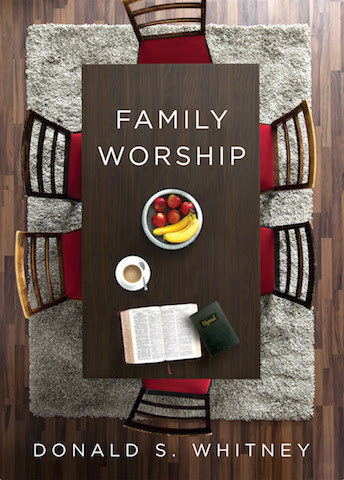
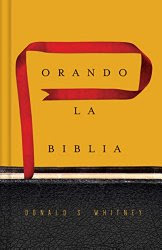
Spiritual Disciplines for the Christian Life
—Now in Spanish!
Does your church have a ministry to Spanish-speaking believers?
Does your church sponsor mission trips to Hispanic countries?
Does your church support ongoing missionary work among Spanish-speaking peoples?
If so, you may want to consider using Disciplinas Espirituales Para La Vida Cristiana.
At present you’ll need to make bulk orders through the publisher, or get individual or small quantities—or the Kindle edition— through Amazon.
Praying the Bible
—Now in Spanish!
Please pass the word about Orando la Biblia to your Spanish-speaking Christian friends and to those ministering among Hispanic peoples.
Although we expect to have these soon at The Center for Biblical Spirituality, for now you’ll need to make bulk orders through the publisher, or get individual or small quantities through Amazon.
Note: for a short time, the Kindle edition of Orando la Biblia is just 99 cents!
It’s currently the #1 selling religious book in Spanish in the Kindle store.
Whitney Family News
The biggest news is that our daughter Laurelen and her husband Mike are expecting our first grandchild—a boy—around June 13. At least that’s the date the doctor expects to induce labor if Laurelen has delivered by then. She has been on bedrest she since was at 31 weeks and having serious contractions. She’s now at 35 weeks and still having contractions. If she makes it to 39 weeks—about June 13—the doctor says she will induce labor. Caffy and I are so excited! You’ll definitely be hearing more about this development!
See Don’s speaking schedule here.
Read Don’s blog here.
April 6, 2016
The Boys in the Boat
I recently finished The Boys in the Boat, and I enjoyed it from stem to stern. One part Seabiscuit, one part Unbroken, and one part Chariots of Fire, it’s the story of “Nine Americans and Their Epic Quest for Gold at the 1936 Berlin Olympics.”
In summary, it’s simply a good tale well told. The story itself is a fascinating one that for much too long has been little known beyond the lore of the University of Washington athletic department. Moreover, author Daniel James Brown is, like John McPhee, the kind of writer who can tell you how they mix concrete in Nigeria and fascinate you with it for 416 pages. Put the two together and you understand why the book was a #1 New York Times Bestseller and has sold well over a million copies.
Joe Rantz and “the boat”
Brown tells most of the story through the life of Joe Rantz, the last oarsman added to the University of Washington crew that eventually won the U.S. rowing championship and the Olympic gold medal only a few yards from Hitler’s gaze. (He’s second from the left in the photo.) I marveled at Rantz’s determination and endurance through obstacle after obstacle from his later childhood until his graduation from college.
Here’s an excerpt recalling Brown’s first conversation with Rantz, just months before Joe died:
His voice was reedy, fragile, and attenuated almost to the breaking point. From time to time he faded into silence. Slowly, though, with cautious prompting from his daughter, he began to spin out some of the threads of his life story. Recalling his childhood and his young adulthood during the Great Depression, he spoke haltingly but resolutely about a series of hardships he had endured and obstacles he had overcome, a tale that, as I sat taking notes, at first surprised and then astonished me.
But it wasn’t until he began to talk about his rowing career at the University of Washington that he started, from time to time, to cry. He talked about learning the art of rowing, about shells and oars, about tactics and technique. He reminisced about long, cold hours on the water under steel-gray skies, about smashing victories and defeats narrowly averted, about traveling to Germany and marching under Hitler’s eyes into the Olympic Stadium in Berlin, and about his crewmates. None of these recollections brought him to tears, though. It was when he tried to talk about “the boat” that his words began to falter and tears welled up in his bright eyes.
At first I thought he meant the Husky Clipper, the racing shell in which he had rowed his way to glory. Or did he mean his teammates, the improbable assemblage of young men who had pulled off one of rowing’s greatest achievements? Finally, watching Joe struggle for composure over and over, I realized that “the boat” was something more than just the shell or its crew. To Joe, it encompassed but transcended both— it was something mysterious and almost beyond definition. It was a shared experience—a singular thing that had unfolded in a golden sliver of time long gone, when nine good-hearted young men strove together, pulled together as one, gave everything they had for one another, bound together forever by pride and respect and love. Joe was crying, at least in part, for the loss of that vanished moment but much more, I think, for the sheer beauty of it.[1]
The deprivation and loneliness Rantz experienced during the Depression were heart-rending. In God’s providence, however (and by the way, this book is not written from an explicitly Christian perspective), what Joe suffered before and during his rowing days, and his grit in overcoming his circumstances (for example, to pay for college he worked one summer suspended by a rope while using a jack-hammer against a rock cliff) were the making of him.
Rowing, and much more
In 1936, as unimaginable as it seems today, collegiate rowing trailed only boxing, horse racing (think Seabiscuit, War Admiral, and others), and of course, baseball for the most column inches in the sports pages of newspapers. The national collegiate rowing championships—which drew from a relatively small number of schools—would sometimes attract 75,000 spectators to the banks of the Hudson River in Poughkeepsie, NY, to watch crews of eight men row racing shells two or three miles.
Despite my lifelong love of sports and enjoyment of 20th century sports history, I had no idea rowing was once this popular in America. I knew it to be an Olympic sport, and that Oxford and Cambridge had been rowing against each other almost as far back as the time of William the Conqueror who rowed over from Normandy in 1066.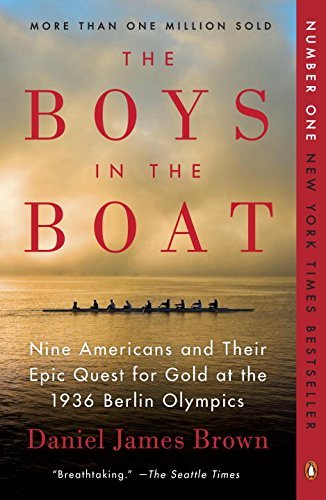
Now I appreciate so much about the sport, even if it’s as a landlubber who’s never been in a racing shell nor watched a race in person. The Boys in the Boat gave me (if only a reader’s) sense of the full-bodied exertion required in rowing, the various roles of each of the eight oarsmen, the coxswain’s many crucial responsibilities as “quarterback” of the boat, the possible strategies in a race, the finesse required of each stroke of the oar, the history of the sport in America, the exquisite craftsmanship of a master shell builder, and so much more, all with Brown’s mesmerizing touch.
I learned a great deal more than about rowing, too. Although I thought I knew a fair amount about the Great Depression, Brown introduced me to some of the hardships I’d not previously known, such as the unusual weather conditions during much of the early Thirties which resulted in the Dust Bowl. Along the way I discovered more about the Pacific Northwest, college life during the Depression, the construction of Grand Coulee Dam, and Nazi Germany (especially Propaganda Minister Joseph Goebbels and Nazi film producer Leni Riefenstahl), than I ever expected when I started the book. The Boys in the Boat is just a beautiful weaving of history and biography that pulls you into its tapestry.
“It has to be about the boat”
The story is so compelling that you may want to intermingle your reading with listening, so the Kindle edition with Audible narration combination is worth considering.
The website for the book, which includes a book trailer, is here.
I think it would be a great book for dads to read with their sons. If you have younger boys, there’s also a “Young Readers Adaptation” for readers in grades 5–9.
As Brown and Rantz finished their first conversation, the author writes:
I shook Joe’s hand again and told him I would like to come back and talk to him some more, and that I’d like to write a book about his rowing days. Joe grasped my hand again and said he’d like that, but then his voice broke once more and he admonished me gently, “But not just about me. It has to be about the boat.”[2]
[1] Brown, Daniel James. The Boys in the Boat: Nine Americans and Their Epic Quest for Gold at the 1936 Berlin Olympics (New York: Penguin Publishing Group, 2013). Kindle Edition, p. 2.
[2] Brown, p. 4.
Donald S. Whitney's Blog
- Donald S. Whitney's profile
- 304 followers


